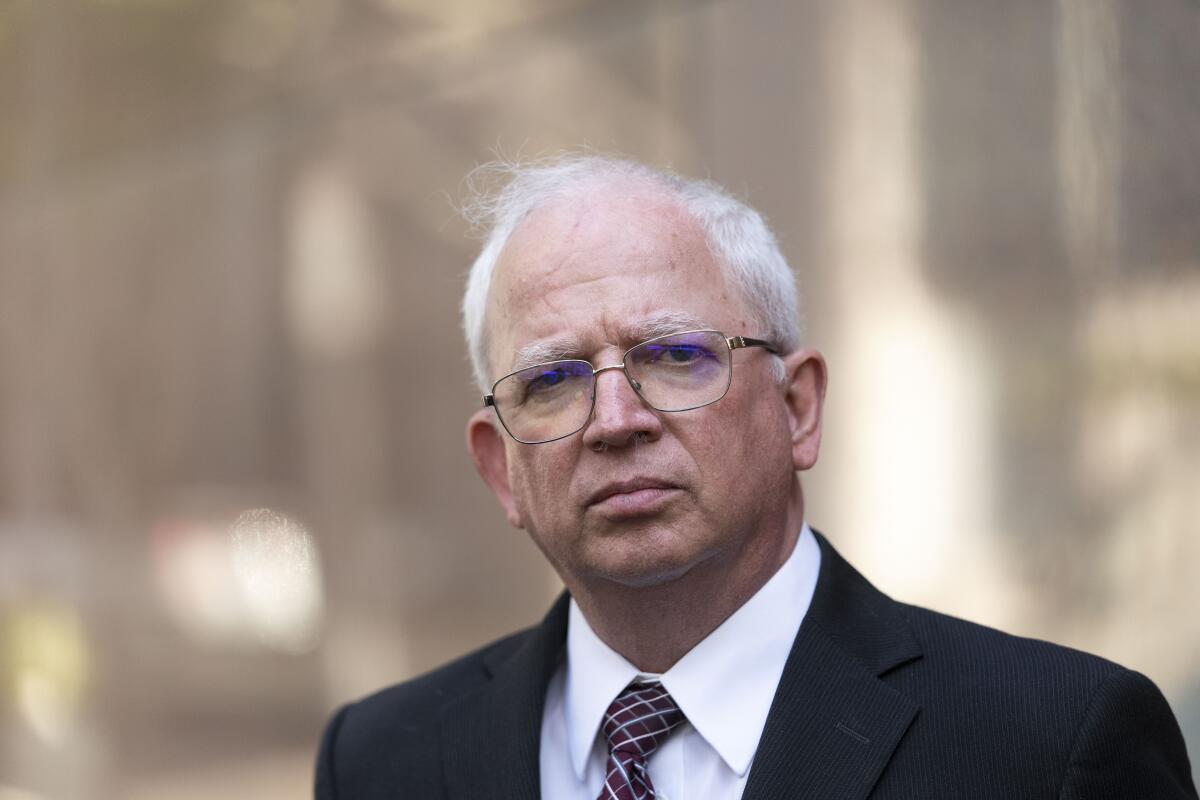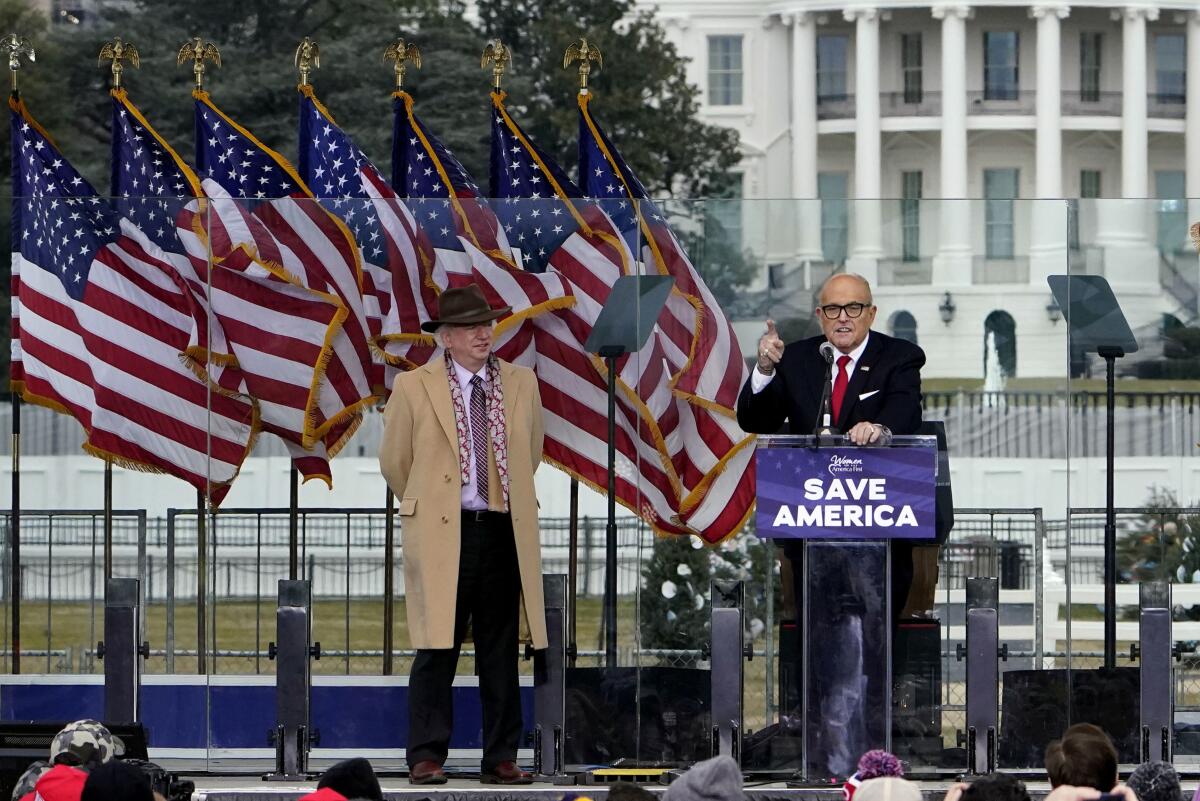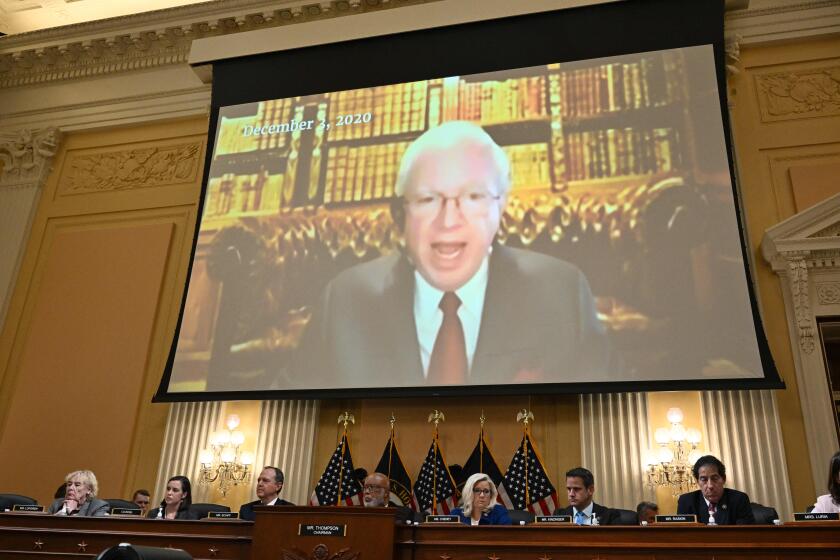Former Trump lawyer John Eastman should lose his license, judge rules

- Share via
John Eastman, the former Orange County law school dean who helped forge Donald Trump’s legal strategy for retaining power after the 2020 election, should be disbarred, a State Bar Court judge ruled Wednesday.
“It is true that an attorney has a duty to engage in zealous advocacy on behalf of a client,” wrote the judge, Yvette Roland. “However, Eastman’s inaccurate assertions were lies that cannot be justified as zealous advocacy.”
Roland’s recommendation to yank the 63-year-old Eastman’s license to practice law in California will go to the state Supreme Court, which has the power to approve it.
In a marathon trial that lasted off and on from June to November, the State Bar, which regulates lawyers in California, argued that Eastman was unfit to practice law for peddling bogus claims that fraud cost Trump the election and for promoting a fake-elector scheme to block the electoral count.
Eastman fomented “predictable and destructive chaos” when he stood beside fellow Trump advisor Rudolph W. Giuliani on Jan. 6, 2021, and told an enormous crowd at the Ellipse that the election had been fraudulent, the bar argued.
Eastman claimed he was acting in good faith, and as a vigorous champion of his client. But State Bar attorneys argued that “the evidence, including his often not-credible trial testimony, shows that he held — and still holds — truth and democracy in contempt.”
In a 128-page ruling Wednesday, Roland said the case “boils down to an analysis of whether or not Eastman ... acted dishonestly.”
She found Eastman culpable of 10 of 11 counts of misconduct. In dismissing one count of moral turpitude, she found no proof that Eastman’s remarks at the Ellipse provoked a crowd to assault the Capitol, as bar attorneys alleged.
Despite Eastman’s repeated assertions that Joe Biden’s victory was illegal, the judge ruled, Eastman’s own words showed he knew that proof was lacking.
The judge cited an email that Eastman sent to a friend, Cleta Mitchell, on Nov. 29, 2020, acknowledging that fraud serious enough to sway the results could not be proved.
“It would be nice to have actually hard documented evidence of the fraud in the areas to which the analyses pointed,” Eastman wrote.
The judge also imposed $10,000 in sanctions on Eastman and noted that he had refused to acknowledge any impropriety.
“His lack of insight into the wrongfulness of his misconduct is deeply troubling,” the judge wrote.
She said that the 1st Amendment does not protect speech used in the commission of a crime — in this case, the attempt to block a legitimate electoral count.
The States United Democracy Center, an election-integrity nonprofit that filed the ethics complaint against Eastman and pushed for the trial, called the ruling a “landmark accountability victory.”
“When he helped Donald Trump try to overthrow the results of a free and fair election, John Eastman put his personal agenda above the decision of American voters,” the group’s chief executive, Joanna Lydgate, said in a statement. “These are among the most serious sanctions a lawyer can receive, and John Eastman deserves them.”
Rather than conduct honest research, Eastman “purposely parroted the misguided opinions and narratives of demonstrably unqualified, unvetted, and unreliable ‘experts,’” bar attorneys argued during the trial.
John Eastman, the former Trump lawyer who helped foment the plan to invalidate the 2020 election results, left the Chapman University law faculty last year. But his legacy still sparks campus questions.
When Eastman urged the Georgia Senate to scuttle the popular vote for Biden and pick Trump electors, he claimed there had been rampant fraud in the state, including evidence of illegal votes from “as many as 2,500” incarcerated felons. The state would determine that only up to 74 potential felons had voted.
The California bar argued that Eastman knew or “was willfully blind” to the falsity of the numbers he peddled, and relied on an affidavit from an accountant with no expertise in statistics or elections.
In the months after Biden won the presidency, courts repeatedly threw out Trump’s election challenges, and the attorney general dismissed the notion of election-tilting fraud.
Yet Eastman’s memos, presented at the bar trial, laid out a strategy in which Vice President Mike Pence would block the certification of Biden’s victory on Jan. 6 by refusing to count electoral votes in swing states.
Eastman knew that his plan was illegal, the bar argued, as shown by his opposition in December 2020 to filing a federal lawsuit testing his theory of Pence’s power to reject electors.
“The risk of getting a court ruling that Pence has no authority to reject the Biden-certified ballots,” Eastman wrote, was “very high.” It was better for Pence “just to act boldly and be challenged,” he wrote.
Eastman promoted the “lawless theory” that Pence could reject electors, the bar argued, hoping to “extend the window for further mischief.” Eastman showed a “complete and total lack of remorse,” portraying himself as a victim of political persecution.
Eastman’s misconduct “strikes at the very heart of what it means to be a lawyer — he misused his license in a grave and injurious manner designed to undermine our democracy,” the bar argued.
During the bar trial, which took place in a downtown Los Angeles courtroom, bar attorneys called election officials from contested states such as Arizona, Pennsylvania and Nevada to detail steps they took to ensure a fair election. Eastman’s legal team tried to show that illegalities marred the contest, but at times, his own witnesses appeared to undermine his case.
Testifying in Eastman’s defense was Michael Gableman, a former Wisconsin Supreme Court justice who has stated the election was stolen. But at the trial, Gableman admitted that his own 14-month inquiry into the election failed to prove that fraud cost Trump the election.
Another Eastman witness, John Yoo, a longtime friend and a Berkeley Law professor, testified that Biden had won the White House “fair and square” and that Pence had “unassailable grounds” in refusing to reject electoral votes.
One of the bar’s star witnesses was Pence’s former attorney, Gregory Jacob, who said that Eastman approached him to argue that Pence could unilaterally toss out electoral votes in contested states where fraud was alleged. Pence rejected the idea, and Jacob accused Eastman of serving as “a serpent in the ear of the president of the United States.”
Eastman, a former clerk for U.S. Supreme Court Justice Clarence Thomas, was dean of Chapman University’s law school from 2007 to 2010. He remained a professor there until 2021, when an outcry against his election-related activity forced his departure.
He has been indicted, along with Trump and 17 others, in Fulton County, Ga., for election-related schemes and has vowed to fight the charges. Four of his co-defendants — including attorneys Jenna Ellis, Kenneth Chesebro and Sidney Powell — have pleaded guilty.

Eastman, a resident of New Mexico who is still licensed to practice law in Washington, D.C., is also an unindicted co-conspirator in the federal election interference case brought by special counsel Jack Smith. Eastman repeatedly invoked his 5th Amendment right against self-incrimination when he appeared before the House Jan. 6 committee, which recommended that the Department of Justice consider prosecuting him. U.S. District Judge David O. Carter ruled that Eastman “more likely than not” broke the law in connection with the 2020 election.
A former Wisconsin Supreme Court justice is the first defense witness called by former Trump advisor John Eastman in his California State Bar trial.
According to his GiveSendGo page, Eastman has raised $636,602 for his legal fees, with a goal of $750,000. In a recent interview with The Times, Eastman said he expects his legal bills — from the bar trial, the Georgia indictment and other election-related troubles — will cost $3 million to $3.5 million. He said he has no regrets.
“Absolutely not,” he said. “Absolutely not.”
He said the bar trial was “extraordinary and unprecedented” but gave him a chance to present wider evidence of election fraud than had been previously aired. “It was eye-opening for a lot of people about the amount of illegality that we exposed during that trial,” Eastman said.
Eastman portrays himself as a battling patriot who has been subjected to “false narratives and calumnies.” He said he is the victim of “lawfare,” an attempt to silence unpopular views with legal machinery.
“We are in a rather significant fight, and for whatever reason, I am the lead point of the spear in that fight, and I am taking it on, as I think my duty as a citizen requires,” he said. “We’ll do what it takes.”
Despite his legal problems, Eastman has continued to speak publicly about the election. He recently got a warm welcome at a luncheon meeting of the East Valley Republican Women Patriots at the Agua Caliente Casino in Rancho Mirage.
“They had over 400 people show up,” he said. There was “overwhelming support and [a] standing ovation.”
More to Read
Sign up for Essential California
The most important California stories and recommendations in your inbox every morning.
You may occasionally receive promotional content from the Los Angeles Times.













